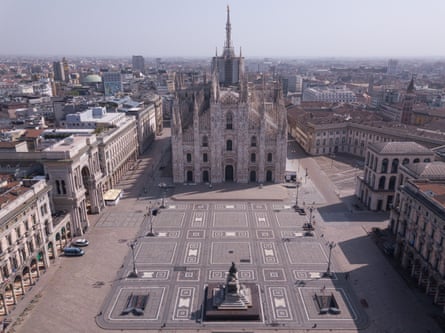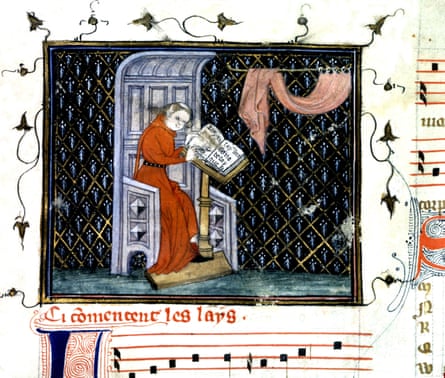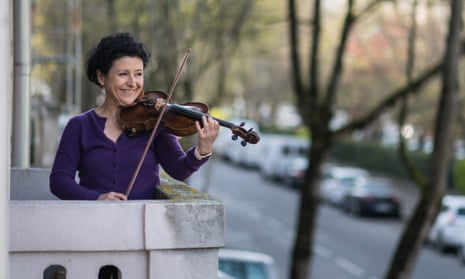Disease is on the prowl. As residents hide behind locked doors, barely a footstep is heard on Milan’s cobbled streets. A strict quarantine is in effect, and all commerce, trade and public life have vanished. The area around Il Duomo, the city’s ornate cathedral, stands empty.
Fearing contagion, all religious gatherings have been banned. But when it comes to their faith – and, importantly, their music – nothing can stand in the people’s way. Following a call to “go to church in spirit”, they launch a collective act of social and musical defiance. Windows are opened, doors unlocked and balconies perched on as thousands of men, women and children start to sing.
No, this is not Milan during the coronavirus lockdown. It’s the summer of 1576, and the plague of Saint Charles has devastated much of the Italian north.
“It was a sight to see,” one commentator reported, “when all the inhabitants of this populous city, numbering little short of 300,000 souls … [sent] up together an harmonious voice.” It was such a sight, he wrote, that Milan appeared as “the heavenly Jerusalem” itself.
“Just think, in walking around Milan, one heard nothing but song,” another remarked wistfully. “One almost wished for these tribulations to last longer.”
The parallels to the current pandemic are striking. People in Italy, Spain and the wider world have used music to bring their communities together on a truly impressive scale: videos of balcony concerts – in which quarantined musicians perform for other nearby residents – are going viral, and covers of Nessun Dorma, Valerie, Imagine and even a spirited run-through of Lewis Capaldi’s Someone You Loved have emerged.
In a poignant echo to the plague of St Charles, one Milanese trumpeter offered his soulful rendition of O Mia Bela Madunina, the city’s hymn to the golden Virgin Mary atop Il Duomo. The UK’s recent Clap for the NHS is another example. In that case, it didn’t matter if you were a musician: pots, pans, hands and shouts were enough.

Such gestures of communality offer us much-needed consolation. But in the broader landscape of history, it would be an anomaly if we weren’t playing music in this way.
From as early as ancient Egypt, Greece and the Babylonians, music has been a reliable tool for spiritual healing and social bonding for thousands of years amid disease. When plague struck Sparta in the 7th century BC, city leaders petitioned the poet Thaletus to sing hymns, and Terpander, another noted ancient Greek poet, was called up during a plague in Lesbos. Even Pythagoras, the creator of every schoolchild’s favourite theorem, used music as a therapeutic device, playing the lyre to calm drunken hooligans.
In medieval Italy, music went far beyond singing from windows, too. Before knowledge of contagion was widespread, the medieval “plague procession” was a recurrent sight on Europe’s streets. Entire towns marched, sang and prayed under icons of local saints, with call-and-response litanies designed to encourage participation. Remi Chiu, a musicologist at Loyola University, finds a parallel in these processions with the “Wuhan jiayou!” – or ‘Stay strong, Wuhan!” – chants that took off in January in the Chinese city where the pandemic began and likewise with the appearance of local patriotic songs on Italian balconies.
Chiu says music’s ability to overcome our egos is a “very powerful” tool in a quarantine. “When you’re making music, you’re submitting yourself – your mind, your body – to its regulation. And when you’re making music communally, or even dancing or doing the Macarena with your neighbours, you’re simultaneously contributing and submitting yourself to the larger goal of the group.” Technology can extend this communality – through a tweet or Facebook post, what would have become a column inch or a forgotten memory can inspire global solidarity.
Religion is playing a far less tangible role today than it did in medieval Italy. While the importance of religion varies from country to country and city to city, that Lewis Capaldi appears at all in our musical response is a significant development. Religion can be a very strong social glue in localised groups, but non-religious music may encounter fewer obstacles in our collective identity politics: if you like Céline Dion, it doesn’t matter if you’re Catholic, Jewish, Protestant or Jedi.
Plus, even in the climate of medieval Europe, religious fanatics were known to take things too far. The “flagellants” found the source of disease in their own sinfulness, and responded in kind through vivid displays of violent masochism. With music again as a driving pulse, flagellants would whip their backs with chains and ropes for hours on end, and to the singular horror of most who saw them.
Social bonds aren’t the beginning and end of music, either. In our response to the coronavirus, balcony concerts have been just one of a range of musical tools we’ve deployed. Virtual gigs, “pandemic pop” and a corona-themed Bono single have so far appeared, but music’s role can be considerably more basic. So long as we use any kind of music to restore balance and reduce our suffering, we’ll be walking in the footsteps of our forebears.
Viewing our minds and bodies as intrinsically connected, medicine since the time of ancient Greece has claimed that maintaining a positive state of mind can offer the conjoining effect of treating physical disease. During the Renaissance, patients were encouraged to compose and study art, joke and laugh with their friends, and also to play music, because the resulting energy would flow favourably to their “humours”: ethereal substances believed to form the building blocks of our constitutions.

Indeed, when plague approached England, it’s no coincidence that Henry VIII chose his organ player as one of the five men he quarantined with; Boccaccio’s Decameron, now a classic of historical fiction, describes a circle of Italian aristocrats who retreat from a mainland plague for days of sex, music and drinking. And as Dr Chris Macklin, a former professor of musicology at Mercer University and an authority on plague music, notes in a blog post, the 14th-century composer Guillaume de Machaut was deeply troubled by the Black Death but none of his music referenced it. Why? “Music is a science which asks that one laugh, and sing, and dance,” he wrote. “It does not care for melancholy, nor for the man who is melancholy.”
Talk of “humours” may seem fanciful now, of course. But this is no reason to do away with the music. “Music is proving to be a true antidote to fear, just as Renaissance doctors claimed,” says Chiu. For patients with schizophrenia, cancer, multiple sclerosis and others – and even those on ventilators – music therapy can significantly reduce in anxiety, depression and sometimes the underlying symptoms of disease.
Macklin writes that “music was not a luxury in times of epidemic uncertainty – it was a necessity”. Now that we’re equipped with technology, science and a global identity, music may be more valuable – and more necessary – than ever.

Comments (…)
Sign in or create your Guardian account to join the discussion